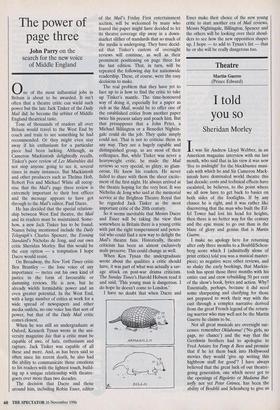The power of page three
John Parry on the search for the new voice of Middle England 0 ne of the most influential jobs in Britain is about to be awarded. It -isn't often that a theatre critic can wield such power but the late Jack Tinker of the Daily Mail did: he became the arbiter of Middle England theatrical taste.
Tens of thousands of readers all over Britain would travel to the West End by coach and train to see something he had recommended. Or they might even stay away if his enthusiasm for a particular piece had been lacking. Although, as Cameron Mackintosh delightedly recalls, Tinker's poor review of Les Miserables did not stop anyone going to see it, several times in many instances. But Mackintosh and other producers such as Thelma Holt, Robert Fox and Michael White all recog- nise that the Mail's page three review is extremely important to their box offices and the message appears to have got through to the Mail's editor, Paul Dacre.
He has decided that the special relation- ship between West End theatre, the Mail and its readers must be maintained. Some- how, a new Jack Tinker has to be found. Names being mentioned include the Daily Telegraph's Charles Spencer, the Evening Standard's Nicholas de Jong, and our own critic Sheridan Morley. But this would be the easy option — a temptation I hope Dacre would resist.
On Broadway, the New York Times critic Ben Brantley — the lone voice of any importance — metes out his own kind of justice in the form of favourable or damming reviews. He is new, but he already wields formidable power and an even greater potential. In the West End, with a large number of critics at work for a wide spread of newspapers and other media outlets, no one voice has that sort of power, but that of the Daily Mail critic comes closest.
When he was still an undergraduate at Oxford, Kenneth Tynan wrote in the uni- versity magazine Isis that a critic must be capable of awe, of hate, enthusiasm and rapture. Jack Tinker was capable of all these and more. And, as has been said so often since his recent death, he also had the ability to communicate those emotions to his readers with the lightest touch, build- ing up a unique relationship with theatre- goers over more than two decades.
The decision that Dacre and those around him, including Robin Esser, editor of the Mail's Friday First entertainment section, will be welcomed by many who feared the paper might have decided to let its theatre coverage slip away in a down- market slither of standards that so much of the media is undergoing. They have decid- ed that Tinker's custom of overnight reviews will continue, as well as their prominent positioning on page three for the last edition. That, in turn, will be repeated the following day for nationwide readership. These, of course, were the easy decisions to make.
The real problem that they have yet to face up to is how to find the critic to take up Tinker's mantle. The time-honoured way of doing it, especially for a paper as rich as the Mail, would be to offer one of the established critics from another paper twice his present salary and poach him. But that presupposes that a John Peter, a Michael Billington or a Benedict Nightin- gale could do the job. They quite simply could not. That is not to criticise them in any way. They are a hugely capable and distinguished group, as are most of their colleagues. But, while Tinker was never a heavyweight critic, he made the Mail reviews so very special, so glitzy, so glam- orous. He knew his readers. He never failed to share with them the sheer excite- ment of the first night. He always arrived at the theatre hoping for the very best. It was Nicholas de Jong who said at the memorial service at the Brighton Theatre Royal that he regarded Jack Tinker as the most important critic of the 20th century.
So it seems inevitable that Messrs Dacre and Esser will be taking the view that somewhere in Britain there is a young critic with just the right temperament and poten- tial who could find a new way to delight the Mail's theatre fans. Historically, theatre criticism has been an almost exclusively male preserve. This could change as well.
When Ken Tynan the undergraduate wrote about the qualities a critic should have, it was part of what was actually a sav- age attack on post-war drama criticism. The Sunday Times's Harold Hobson read it and said, 'This young man is dangerous. I do hope he doesn't come to London.'
I have no doubt that when Dacre and ARMADtLLo Esser make their choice of the new young critic to start another era of Mail reviews, Messrs Nightingale, Billington, Spencer and the others will be looking over their shoul- ders to see how the new opposition shapes up. I hope — to add to Tynan's list — that he or she will be really dangerous too.


















































































 Previous page
Previous page